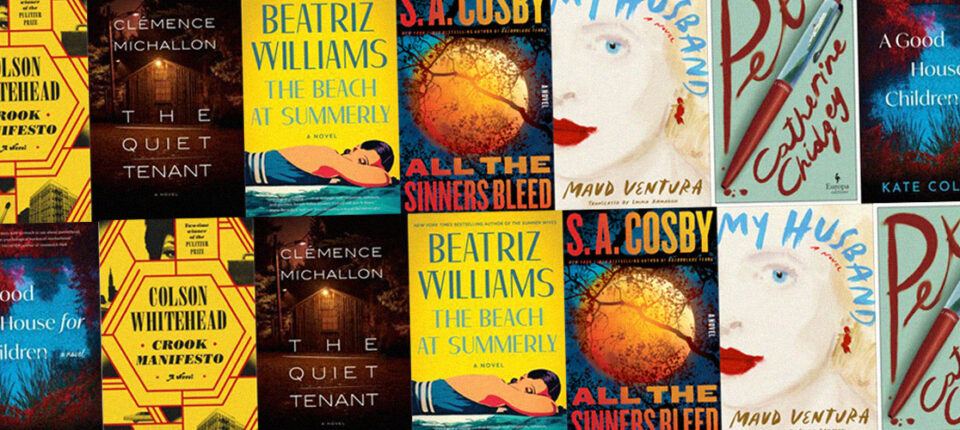A look at the best reviewed fiction from June, July, and August.
*
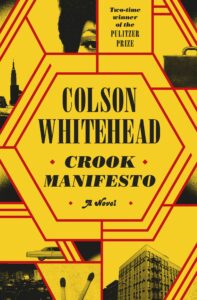
Colson Whitehead, Crook Manifesto
(Doubleday)
“Crook Manifesto is a dazzling treatise, a glorious and intricate anatomy of the heist, the con and the slow game. There’s an element of crime here, certainly, but as in Whitehead’s previous books, genre isn’t the point. Here he uses the crime novel as a lens to investigate the mechanics of a singular neighborhood at a particular tipping point in time. He has it right: the music, the energy, the painful calculus of loss. Structured into three time periods — 1971, 1973 and finally the year of America’s bicentennial celebration, 1976 — Crook Manifesto gleefully detonates its satire upon this world while getting to the heart of the place and its people … Whitehead bends language. He makes sinuous the sounds of a city and its denizens pushing against the boundaries. He can be mordantly funny.”
–Walter Mosley (New York Times Book Review)

Maud Ventura (transl. Emma Ramadan), My Husband
(Harpervia)
“Ventura does an excellent job of slowly escalating the narrator’s neuroses … And yet the book, while disturbing, is also very funny … Will have you thinking hard about the meaning of love.”
–Laurie Hertzel (Star-Tribune)
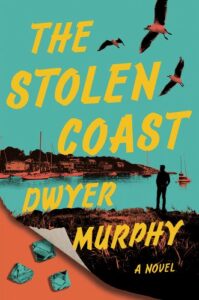
Dwyer Murphy, The Stolen Coast
(Viking)
“If you, like me, lament the absence in modern-day Hollywood of the whip-smart neo-noir thrillers that flourished in the 1990s…then I have great news for you. It comes in the form of Dwyer Murphy’s second novel, The Stolen Coast, which offers all the abundant pleasures of those films, and more. Of course, many of those movies, like After Dark, My Sweet and Out of Sight, were themselves based on classic noir novels, and Murphy’s follow-up to his strong debut, An Honest Living, makes a convincing case for inclusion on that shelf. It’s a twisty, enthralling heist yarn, sure, but what strikes you most is the confidence … The significant delights in “The Stolen Coast” lie not so much in how it all unfolds or unravels but in the dance between this intoxicating pair: their sly words, their weighted glances and their worthless promises.”
–Adam Sternbergh (New York Times Book Review)

S.A. Cosby, All the Sinners Bleed
(Flatiron)
“Cosby worked the outlaw side of the crime/suspense genre. In this new one he’s written a crackling good police procedural … Cosby delivers a fine climax. Then, in an epilogue, he serves up a final treat that’s worth the whole trip. So: a well-told novel of crime and detection. There are plenty of them on the market. What sets this one apart, what gives it both grit and texture, is its unerring depiction of small-town rural life and the uneasy (and sometimes violent) interactions between Charon’s white and Black citizens … Cosby keeps his eye on the story and the pedal to the metal … I found Cosby’s detail work fresh and exhilarating. Without resorting to country music clichés, he gets everything right … It’s a far better novel than Cosby’s earlier books; his confidence as a writer has increased as he climbs the learning curve of his trade.”
–Stephen King (New York Times Book Review)

Beatriz Williams, The Beach at Summerly
(William Morrow)
“There are few more skilled practitioners of the craft of summer fiction than Beatriz Williams. Her latest is both a spy thriller and a Romeo and Juliet tale of would-be lovers torn apart by fate and circumstance … Enriched by fascinating historical details and an espionage theme … Williams has crafted a layered narrative celebrating a heroine who embodies verve, pluck and courage. Ultimately The Beach at Summerly is an ode to a season and a feeling. If our summers past represent a paradise lost, as selves that once were, or might have been, then in Williams’s pages we may briefly recapture the delicious freedom we used to feel when the days became longer and warmer, and we were young and in love.”
–Leigh Haber (New York Times Book Review)
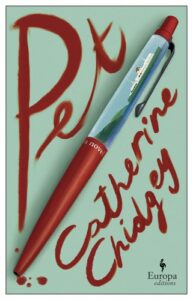
Catherine Chidgey, Pet
(Europa Editions)
“Chidgey’s examination of sexual politics is ruthless … The novel hums with the low-level fever of adolescent boredom and betrayal … Chidgey’s grasp of the slipperiness and self-delusion of memory – from Justine as an increasingly unreliable narrator, to her father’s later dementia – is faultless.”
–Catherine Taylor (Guardian)

Clémence Michallon, The Quiet Tenant
(Knopf)
“An expertly paced psychological thriller … Seeing Aidan through the eyes of people who view him benignly, even lovingly, we feel the danger in each of this monster’s relationships and the ways in which people are blinded to it … In less capable hands, so many points of view could have felt messy and confusing; but Michallon makes deft use of this structure to build momentum toward a white-knuckle climax.”
–Jac Jemc (New York Times Book Review)
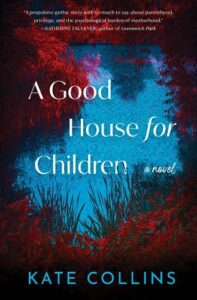
Kate Collins, A Good House for Children
(Mariner)
‘It has a little bit of all things not very nice that make up a page-turning popular novel, without resorting to moral simplicity or predictability … [Collins] evokes her characters and scenes deftly. Not only that, but the whole thrust and purpose of the book add up so well, issues are handled with such lightness of touch, that this reads like a novelist in her prime, rather than a beginner.”
–Lucy Sweeney Byrne (The Irish Times)
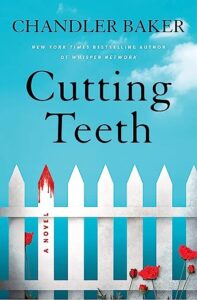
Chandler Baker, Cutting Teeth
(Flatiron)
“Both a searing social commentary on female friendships, community ties and modern motherhood, and a riveting murder mystery, Cutting Teeth is delightfully weird, jaw-droppingly brilliant and wickedly funny.”
–Rebecca Munro (Bookreporter)
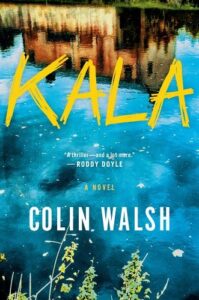
Colin Walsh, Kala
(Doubleday)
“A master class in building suspense … Walsh manages a deft balance between adolescent angst and ecstasy — discoveries bringing horror, sorrow and joy — and the more deliberate, often elegiac reflections of adulthood, reckoning with the promises of the past … With revelation upon revelation, their ordinariness seems all the more mysterious, and this first-time novelist all the more masterly at writing in such an original voice.”
–Ellen Akins (Washington Post)

